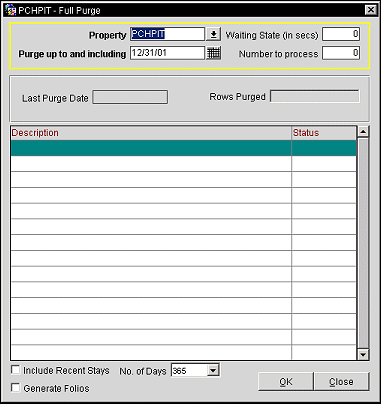
Full Purge
Full Purge utility (Data>Full Purge) allows properties to remove historical reservations and associated data such as financials, journal entries, etc., from the OPERA application. The Full Purge will only delete reservations and associated records having a reservation departure date older than 2 years from the current business date. During the Full Purge routine OPERA will create PDF files of detailed folios for each window belonging to a reservation stay that is being purged. This will in turn allow properties to continue to make use of the folio history option in cashiering for these reservations, and to access the associated financial data these folios contain.
Note: The Generate Folios check box may be un-selected if you do not wish to generate PDF copies of folios.

The parameters on this screen are described in the Full Purge Utility Technical Details.
To start the purge, select the OK button.
Note: A password, available from Oracle Development, is required in order to run this utility. To obtain the Full Purge password, the site or region must provide:
- Property Code
- Business Date(s) when the full purge will be performed
- Business Date through which the site wishes to purge data. Please note that when Full Purge is performed, OPERA will only allow a purge date that is at least is 2 full years older. For example, if Property A has a business date of May 04, 2010, data can be purged only through December 31, 2007. This means that data for the years 2008, 2009, and 2010 through the current date will not be purged. (The 2 full years requirement does not apply to properties that have a difference of 90 days or more between the current business date and the system date. Such properties are considered as “Inactive” for the full purge. This is more relevant to properties in test environments than the actual live properties in production. See Full Purge Utility Technical Details for information on running the Full Purge Utility for inactive properties.)
Prior to starting the purge, the routine automatically ensures that sufficient rollback and table space exists for building purge tables, holding the purge details, and for storing historical copies of purged folios in PDF form ( the amount of space necessary to hold this information is minimal). In addition, the routine ensures that all ledgers are in balance. As the Full Purge runs, OPERA dynamically indicates the number of reservations pending purge as well as the percentage completed.
When the Full Purge runs, any profiles that have already been marked with the “Purged- Individual” profile by the monthly End of Day Purge routine will be available to be removed. OPERA will retrieve all reservations that are eligible for purging (eligible reservations are those that have a departure date greater than the cutoff date specified in the Full Purge setup form). If the payment method is direct bill, the system will verify that the invoice does not have an open balance. If the invoice has an open balance, that reservation and corresponding financial records will not be purged. Also, open commissions are checked for before deleting financial and reservation information for that guest. Next, the folios will be stored as PDFs having a filename in the following format: RESVNAMEID_last name_foliowindow. These folios are placed in a folder that is appended to the forms output path, for example, D:\micros\opera\export\schema\property\folios\<date>. The <date> portion of the path reflects the departure date of the guest. To access these folios, use the Cashiering>Cashier Functions>Folio History menu option.
After the folio PDF is created, the system deletes all rows for the reservation, including all associated financial table rows. Each folio that is created will have 1 row added in a separate table where its financial data is recorded. This will allow regenerating the trial_balance and accurate preparation of other financial reports.
When the Full Purge is complete a message informs the user of the number of reservations that have been successfully purged.
See Also